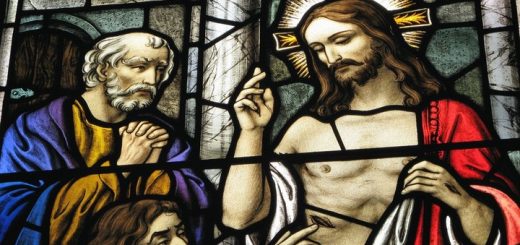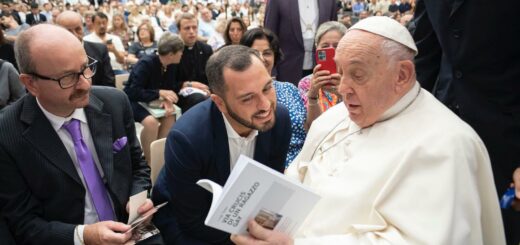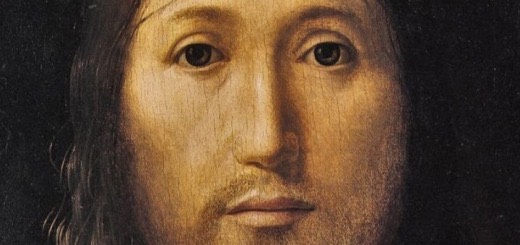"This is the night." The Easter Triduum starting from the end
Reflections by Luigi Testa*
Prepare for the appointment. You understand everything better from its end; This is also the case for the days that await us, until Easter night. All over, of course, we will never understand it, and perhaps it is good so. But we should still start from there - from the liturgy of night between the nights - To better sink into the amazement of the next few days. Because this is: of sinking. Squeezing himself strong to him, because he takes us down, down, in the bottom, and then be dragged up again with him.
The Easter triduum is not an appointment that you can get unprepared. It's too big - it's simply too - Because we can think of understanding something while we are inside. It will be too rich, too quick, like a fall, everything will flow so quickly on us, it will overwhelm us everything so quickly, and we will find ourselves without realizing it at the dawn of Sunday. We have to get there at least a little prepared, as you prepare for the special appointment with the person you love.
"The hour comes, and this is this"
If then we start from the end, in the immense richness of the liturgy - almost a waste, like that Nardo, that evening in Bethany, who, however, will fill our days as then filled the whole room - affects that obsessive return, in the great announcement of the resurrection, of an expression: "This is the night". This. «The hour comes, and it is this»(Jn 4, 23), the master announced -"Venit hora et nunc est».
This, "Nunc" now: not another. "This is the night", and it is said today; Not like a voice that comes from the past, no: it is a contemporary voice. And that the mystery of Christ is contemporary to every man is the most important reading key of Christianity.
We are stopped on that night - indeed, in this Night. We are stopped there: at the time of his Easter - at the time of his death and resurrection - it is a single hour, as the celebration of the Easter triduum is the only one, a single movement: his emptying and, at the time of the consumption of this emptying, his glorification - as is a single moment that of the bomb that explodes as soon as combustion has been consumed.
The small eyes of our humanity see a progressive development over time, but it is the same one hour. At any time of the Easter triduum, we access the only act of Christ, the only love: this It is the night when our betraying is enveloped in loyalty; This It is the day when life enters death, and swallows it in itself; this It is the night "that rejoins the earth with the sky and the man to its creator".
"Everything is accomplished"
And not only in this hour the mystery of Christ is concentrated. Moreover. This is the time - there is no another one - in which the whole history of humanity condenses. In which the whole story has recapitulated (see EF 10). "Everything is accomplished": there is nothing else that must be accomplished, there is nothing else to expect. History, in reality, does not exist. All it is accomplished, in that hour - that it is this hour, in which we are all kept.
If we do not realize it, it is because our humanity is imprisoned in the category of time. But time as succession belongs only to this present economy, which is the economy of the sign, not of reality. The reality is other: it is that of eternity, and in eternity time cannot exist as succession. Eternity is not an infinite succession of moments: it is an eternal moment, which does not end. It is an "nunc", a time, a "hour", so full, to keep everything in itself.
Only if you try to adopt this perspective gaze, can those words of Jesus understand each other: "Everything is accomplished", and "the hour comes, and this is this", as well as the return of the premonium: "This is the night". AND this: And it is precisely that of his death and resurrection, of his emptying and glorification, two movements of a single act.
This act constitutes, in fact, the last definitive moment of the process of taking our humanity in him. Now everything has assumed: nothing has remained outside. He has even assumed the most human thing that is there: the feeling of feeling abandoned from heaven. There is nothing of the humanity to which he has not united, he has not taken, he has not had on his skin, in his body.
I will attract everything to me.
It is not an abstract humanity that he has made his own. There is no humanity in the abstract. «With the incarnation the Son of God united in a certain way to every man» (Guadium et spes, 22). It is my personal, single, individual humanity - is my story, the only one - to which he has united inextricably.
The humanity in which every single man, of the past and the present exists, since the world exists until it exists, has been taken by the Word. He is at the center of the story, and attracts everything to himself, past and future: "And when I will be high from the ground, I will attract everyone to me" (Jn 12, 32). I will attract all over To me.
In the economy of the sign, to my little humanity, it seems that there is still a development of history, but in reality the story is contained in that act - everything is summarized, it is rewinded, In him (see EF 10).
My story, my humanity, my labors, my happiness, my fragility, my desire, my loves are all there - in that hour, in quest'Now - because everything has been assumed by him, and, since assumed, saved: only as we do not let himself be united, because everything is hired, except the tragic possibility of one of ours no.
Our staff "Exultet"
"This is the night": there is nothing else, there is no tomorrow, there is no new one. "This is the night" in which there is everything, where everything is born. If we were really Christian, we should celebrate in this Night the beginning of our love stories, because everything that is fully human - and first of all our love - flows from this night - from his Easter love -, and on this night it remains firm forever, assumed, redeemed, guarded, saved.
I didn't meet the person I am in love with one day in Milan, we didn't kiss the first time one evening in Porta Venezia: this is only what my little eyes see. I met him and we kissed the first time in this night, where everything is kept.
A good spiritual exercise could be to compose our staff Exultet, to be prayed in the days of the triduum.
This is the night In which we remain together embraced, for eternity, I and I.
This is the night In which you keep me with you at the table, while you have dinner with yours, and you hide in some crumb of bread.
This is the night in which I dry the sweat of blood and water that stains your forehead.
This is the night - "He got dark on the whole earth" (Mt 27, 45) - in which I give me everything, up to the last drop of blood from the heart.
This is the night in which we sink together in the darkness of the sepulcher.
This is the night In which you drag me out with you from the sepulcher - from every sepulcher in which I locked myself - "Drag me with you, let's run!" (CT 1, 4).
This is the night in which I walk in history, but you are with me; in which I fall and hurt myself, but you are with me; in which I struggle and I have a trouble, but you are with me; in which they hurt me and I remain sad, but you are with me.
This is the night in which my humanity blooms, and you smile; In which I can love a bit like you, and you smile at me.
This is the night In which I fell in love, in which my love was born, in which everything was born beautiful. This is the night, in which we are always together, and it's all safe.
*Luigi Testa is the author of legal texts and writes in some national newspapers. "Via crucis of a gay boy"(Castelvecchi, 2024) is his first spiritual book, his other reflections are also published on Gionata.org






